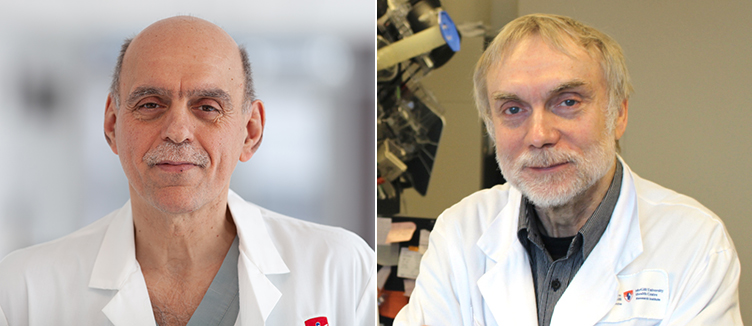
Breadcrumb
- News and Events
- News
- Content
- RI-MUHC-led team receives $3.4M for new Centre for Applied Nanomedicine
null RI-MUHC-led team receives $3.4M for new Centre for Applied Nanomedicine
The study of exosomes will foster research on the frontier of personalized medicine
Source: RI-MUHC. A research team has obtained $3.4M in infrastructure funding to establish the new Centre for Applied Nanomedicine (CAN) at the Research Institute of the McGill University Health Centre (RI-MUHC). A node in technology network connecting several McGill labs, this cutting-edge facility will accommodate the study of exosomes, also known as extracellular vesicles. These mobile elements implicated in cellular communication have been found to hold diagnostic potential.
The CAN will provide a valuable platform for researchers aiming to decipher information about cancer, infectious disease and immunity from exosomes in the bloodstream. The project, titled “Centre for Applied Nanomedicine (CAN) – Studies into Extracellular Vesicle Heterogeneity, Biomarkers and Function,” is one of nine from McGill University funded through the Canada Foundation for Innovation’s (CFI) recent Innovation Fund competition, as announced on March 9, 2021. This funding represents a major investment in research infrastructure by the Government of Canada as well as by the Province of Quebec, which contributes matching funds.
The project leads, RI-MUHC senior scientists Janusz Rak and Peter Metrakos, are joined by colleagues from the RI-MUHC and across the McGill network: Martin Olivier, Nada Jabado, Inés Colmegna, Kolja Eppert, Peter Siegel, David Juncker, Sara Mahshid and Yasser Riazalhosseini. All are professors in the Faculty of Medicine and Health Sciences at McGill University.
Inspiring innovative medical applications
The range of research projects that will rely on the CAN platform shows how fundamental biological processes such as exosome release can transform multiple fields and inspire innovative medical applications. For example, cancer cells release exosomes into blood and thereby become “visible” to non-invasive diagnostic methods (blood tests) known as liquid biopsy. CAN instruments are designed to track exosomes and potentially help researchers get “ahead” of the disease, be it cancer, infection, or destructive inflammation.
Using such powerful tools as liquid biopsies, members of the group are exploring how to understand the information deposited into the bloodstream by the cancer.

“Exosomes enter into the blood from every cell in the tumour, so with sufficiently sensitive detection methods, we can track mutations within the cancer, giving these exosomes unprecedented diagnostic potential,” says Dr. Rak, who is a senior scientist in the Child Health and Human Development Program at the RI-MUHC. “We’re reaching the point in the molecular characterization of cancers where these features could be used for making clinical decisions.”
“We’re identifying ‘signatures’ in this genetic information so we can determine what a tumour is doing,” says Dr. Metrakos, leader of the Cancer Research Program. “If mutations go down, we would know our treatment is working.”
The new equipment will be made available to researchers who wish to pursue exosome or small particle studies in health and disease, in the context of services offered by the Centre for Translational Biology Technology Platforms at the RI-MUHC.
Congratulations to the CAN team, as well as to Mark Lathrop, Bartha Knoppers, Robert Koenekoop, Myriam Srour, Christina Wolfson and other RI-MUHC scientists who are co-applicants on projects funded in this competition! Learn more
March 19, 2021
Related news
Drivers of personalized medicine
$110M for nine innovative McGill research projects
$9.6M federal infrastructure investment renews Canada’s largest study of aging